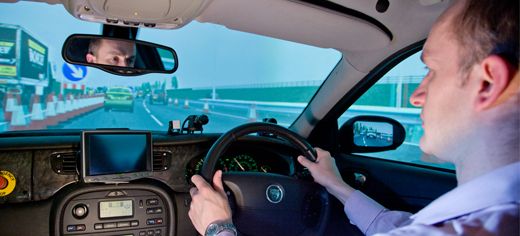
Researchers from the University of Leeds are involved in a unique, five-year £10 million collaboration to improve virtual engineering.
Scientists from the University’s Institute for Transport Studies have joined forces with three other leading UK universities, car-maker Jaguar Land Rover and the Engineering and Physical Sciences Research Council (EPSRC) to deliver the project.
Leeds’ researchers are working on a driving simulation which offers a realistic digital driving and passenger experience, in order to help with the vehicle design process.
Hamish Jamson, Principal Research Fellow, Institute for Transport Studies at the University of Leeds, said: “This is a very exciting, interdisciplinary project. We will be using one of the most advanced driving simulators worldwide, developed here at Leeds, with a view to streamlining Jaguar Land Rover’s vehicle design process.
“Undertaking preliminary vehicle testing of both handling and design in a virtual environment, we aim to support a more efficient vehicle design cycle, examining the extent to which interactive driving simulation can reduce the building of expensive physical prototypes.”
The unique £10m five year collaboration between Jaguar Land Rover and the country’s leading academics will develop the capability of the virtual simulation industry in the UK and will give car manufacturers access to new, world-class simulation tools and processes. This is the first phase of a 20 year strategic project that could put the UK at the leading edge of virtual simulation globally.
The research will improve the quality and capabilities of simulation, using sights, sounds and even smells to make virtual simulation more realistic.
Giving engineers a more realistic perception of what a design might achieve, as well as giving them access to more powerful computers, will mean even more engineering can be virtual. This will help car manufacturers deliver more complex new vehicle programmes more quickly. It will also help save costs in product development by reducing the reliance on physical prototypes and have environmental benefits by limiting the number of prototypes that need to be driven and tested in the real world.
Announcing funding for the first phase of the 20-year ‘Programme for Simulation Innovation’ project, Secretary of State for Business, Innovation and Skills, Dr Vince Cable MP, said: “With world-class universities and cutting edge companies like Jaguar Land Rover, the UK is well placed to be at the forefront of driving innovation and developing new technology. This investment will support the Government’s industrial strategy by boosting the UK’s manufacturing capability and helping to keep us globally competitive.”
EPSRC Chief Executive, Professor David Delpy, said: “This partnership shows how the research community can work hand in hand with industry to push boundaries in science and engineering.”
Further information:
Ben Jones, Press Officer, University of Leeds, phone +44 (0)113 343 8059 or email: B.P.Jones@leeds.ac.uk
Nick O'Donnell, Global Corporate PR Manager, Jaguar Land Rover Corporate Communications, phone +44 (0) 7825 115951 or email: nodonne2@jaguarlandrover.com
Richard Tibenham, Senior Media Relations Manager, EPSRC, phone: +44 (0)1793 444 267, +44 (0)7767 311 484 or email: richard.tibenham@epsrc.ac.uk